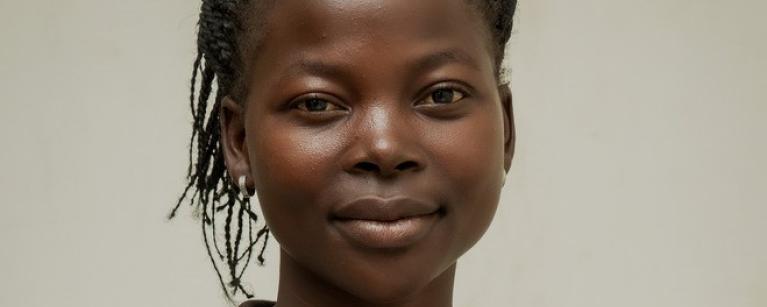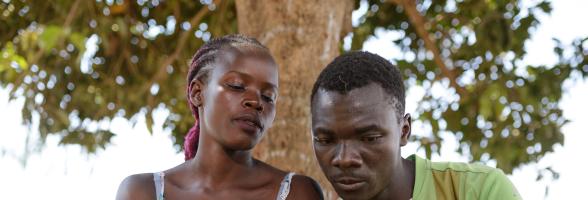Like the other female participants of the Youth Employment and Empowerment Project (YEEP), Gift Ayerango got married early, dropped out of school prematurely, and struggled to raise her children without any income.
For a young girl who had dreams of becoming a successful businesswoman, giving birth and marrying at a young age was a big barrier to her dreams.
Today, at 28 years Gift tells her story of social-economic emancipation and how she is championing efforts to influence opportunities for other young women.
Gift’s background, just like many young girls in the various districts of Uganda played a big role in hindering her dreams. She comes from a poor family of six children, living in a rural area that is vulnerable to economic, and environmental shocks.
In early 2020, shortly before the outbreak of COVID-19, Gift heard of several social-economic empowerment trainings for youth groups that were taking place in Nebbi under the facilitation of the African Youth Development Link (AYDL) and the International Foundation for Recovery and Development (IFRAD). She was impressed by the youth who had acquired skills and owned small businesses which they started in her village.
““Oh God how I admired them and wanted to be a part of this training too!“ ”
But because she was married, it wasn’t easy for Gift to attend the training without the approval of her husband. Gender roles in Uganda are still heavily inclined toward traditional roles.
For most of the women living in rural areas like Gift, their roles are largely domestic including housekeeping, childbearing, collecting water from the well, cooking, and tending to community needs.
Therefore, Gift’s position in the community could not allow her to fully participate in gainful employment, which was a barrier to her personal development. However, the YEEP was specifically targeting disadvantaged youth like Gift with an overall goal to improve their livelihoods and participation in governance and development processes in their communities.
When Gift approached the IFRAD team on the ground, she was immediately supported to join the training. The local leaders including the community development officer and LC1 chairperson supported Gift in convincing her family to allow her to attend the training.
The training and mentorships were a great way to connect with women who have made headway in predominantly male trade and shed some light on how women and girls can participate and successfully run their businesses.
Upon successfully completing the training, Gift joined the Piryemocan Youth Savings Group, affectionately known as "Chasing Away Poverty," where she was voted as the group's inaugural chairperson. Because of Gift’s leadership skills, she was further selected as one of the influencers for the YEEP.
This appointment enabled her to collaborate with local partners in advocating for gender inclusivity forward in the Nebbi sub-county. As a community influencer, Gift has successfully sensitized communities in Nebbi District about the harmful effects of child marriage and helped secure commitments from local and traditional leaders to end the practice in their communities.
Gift and the other Community influencers convinced the district leadership during the youth parliament debates to come up with ordinances to reduce the number of days traditional marriages are celebrated from 3 to only 1 day to reduce the instances of young girls and boys getting intoxicated and engaging in anti-social behaviour, making them vulnerable to teenage pregnancy. These ordinances were also endorsed by the Alur King.
Gift has further used her new position to mobilize, inspire and speak against, domestic violence, teenage pregnancy, and how to break the stigma surrounding it whenever she gets the opportunity. She supported young girls who are survivors of gender-based violence through counselling.
Together with other YEEP influencers, she advocated for a policy change to protect survivors of domestic violence and provide them with the resources they need to recover. Gift believes that their voices through the campaign also made a contribution to influencing the Ministry of Education’s change of its policy to allow pregnant girls back into school after the COVID-19 lockdown was lifted.
The number of teenage pregnancies across the country shot through the roof during the COVID-19 lockdown.

